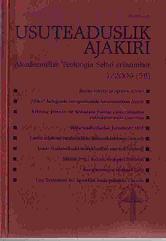Luuka eripärast varakristliku inimesekäsitluse kujunemisloos
Luke's Role in Shaping the Early Christian Anthropology
Author(s): Randar TasmuthSubject(s): Christian Theology and Religion
Published by: Akadeemiline Teoloogia Selts
Keywords: New Testament Studies; Luke
Summary/Abstract: The author of the Gospel of Luke demonstrates considerable familiarity with the views that were more or less known among the Greek speaking population around the Mediterranean. Luke associated soul with life in general. This view was common among the Hellenistic people since the times of Homer, but is visible also in the Hebrew Scripture. In both cultures human being is seen as a living soul. No wonder that Luke shares these views with Mark and Matthew who based their presentations largely upon Jewish understanding of man. As to the influence of Greek philosophy, according to the present study Luke did not have much in common with Plato, there are no signs of distributing a soul into parts that have different qualities as was the case in Plato’s teaching. However, there are some similarities between the views of Luke and Aristotle as they regard that soul and body belong together. Whereas Aristotle described body as a form of a soul, Luke used the word form to tell how the Holy Spirit descended upon Jesus in a bodily form like a dove – even a spirit needs a visible form in order to appear in front of men. Attention may be drawn here to the stylistic parallelism of soul and spirit; this parallelism can already be observed in Magnificat. The descriptions of the appearances of Jesus to the disciples in Emmaus and in Jerusalem (24:13-43) have much in common with similar events described in the Gospel of John. Luke, however, chose the words spirit and flesh (with bones) in order to emphasize the corporeality of Jesus in the most contrasting way. This choice of the words, according to the author of this article, indicates that Luke does not want to describe body and soul as if representing some kind of rivalry or even mutually excluding each other. Neither body nor soul is mentioned here, but if the evidence of the whole gospel is considered, they are inseparable and rather seem to be on the same level. The spirit, however, has a position above the flesh.
Journal: Usuteaduslik Ajakiri
- Issue Year: 2009
- Issue No: 1 (58)
- Page Range: 79-110
- Page Count: 32
- Language: Estonian

